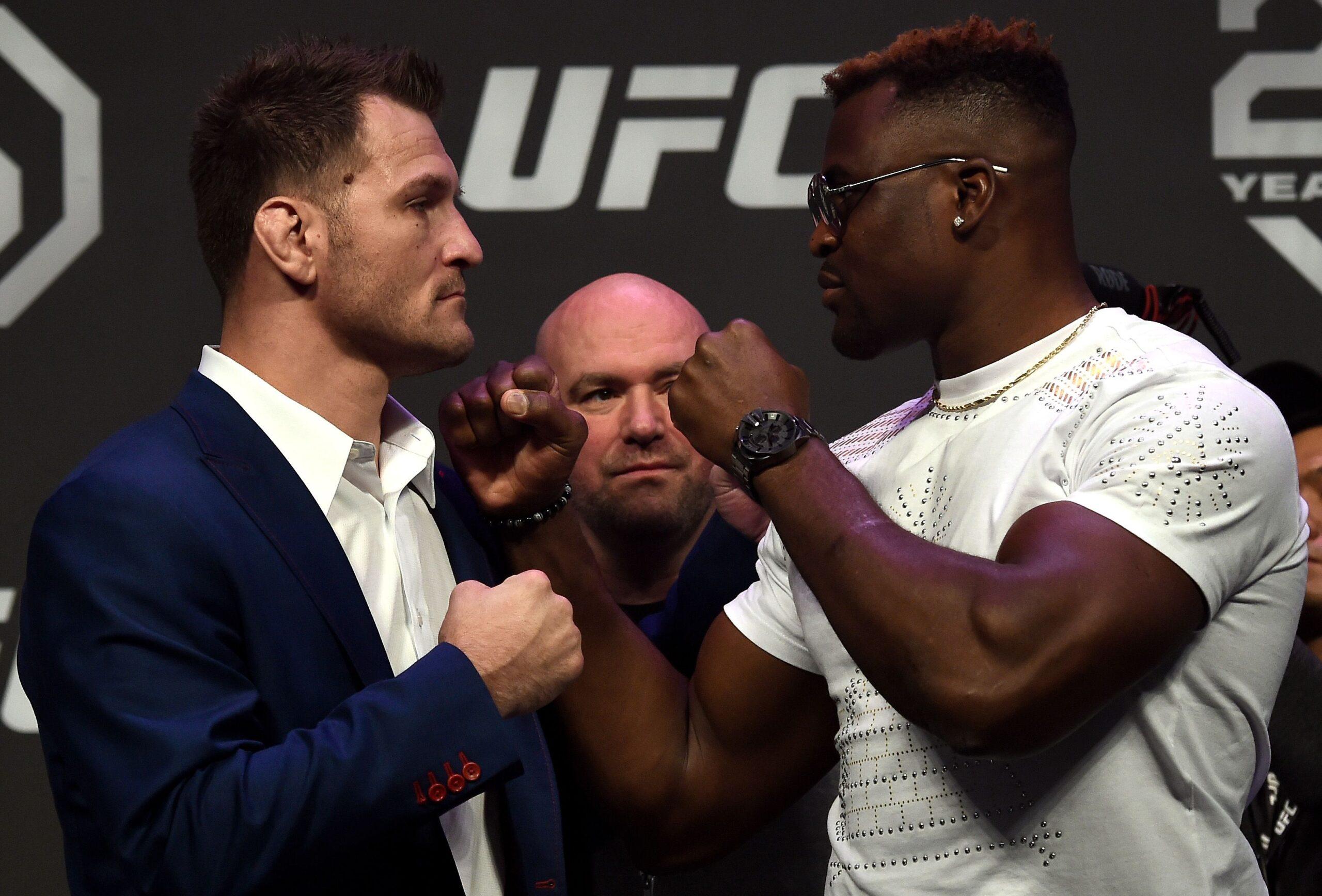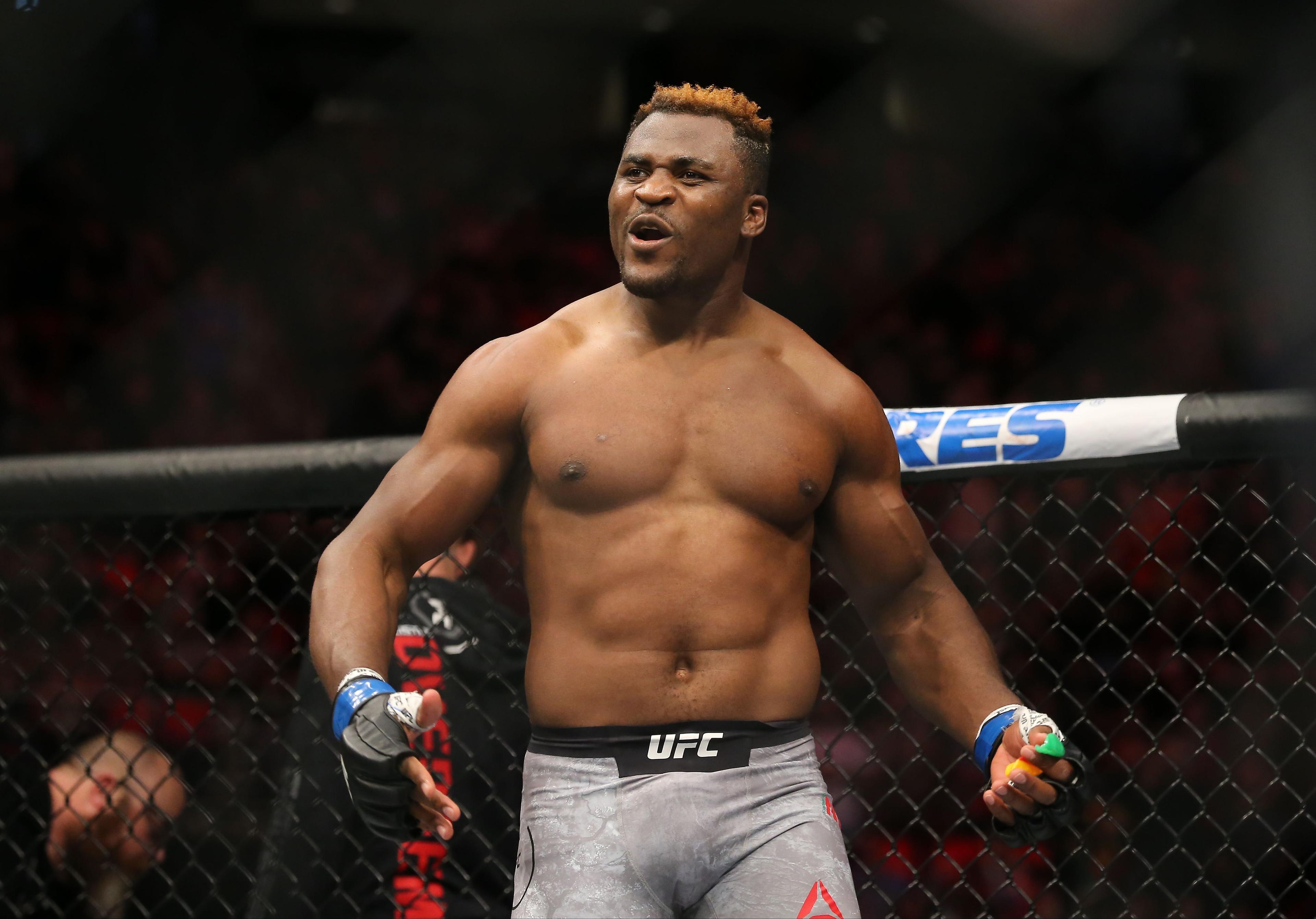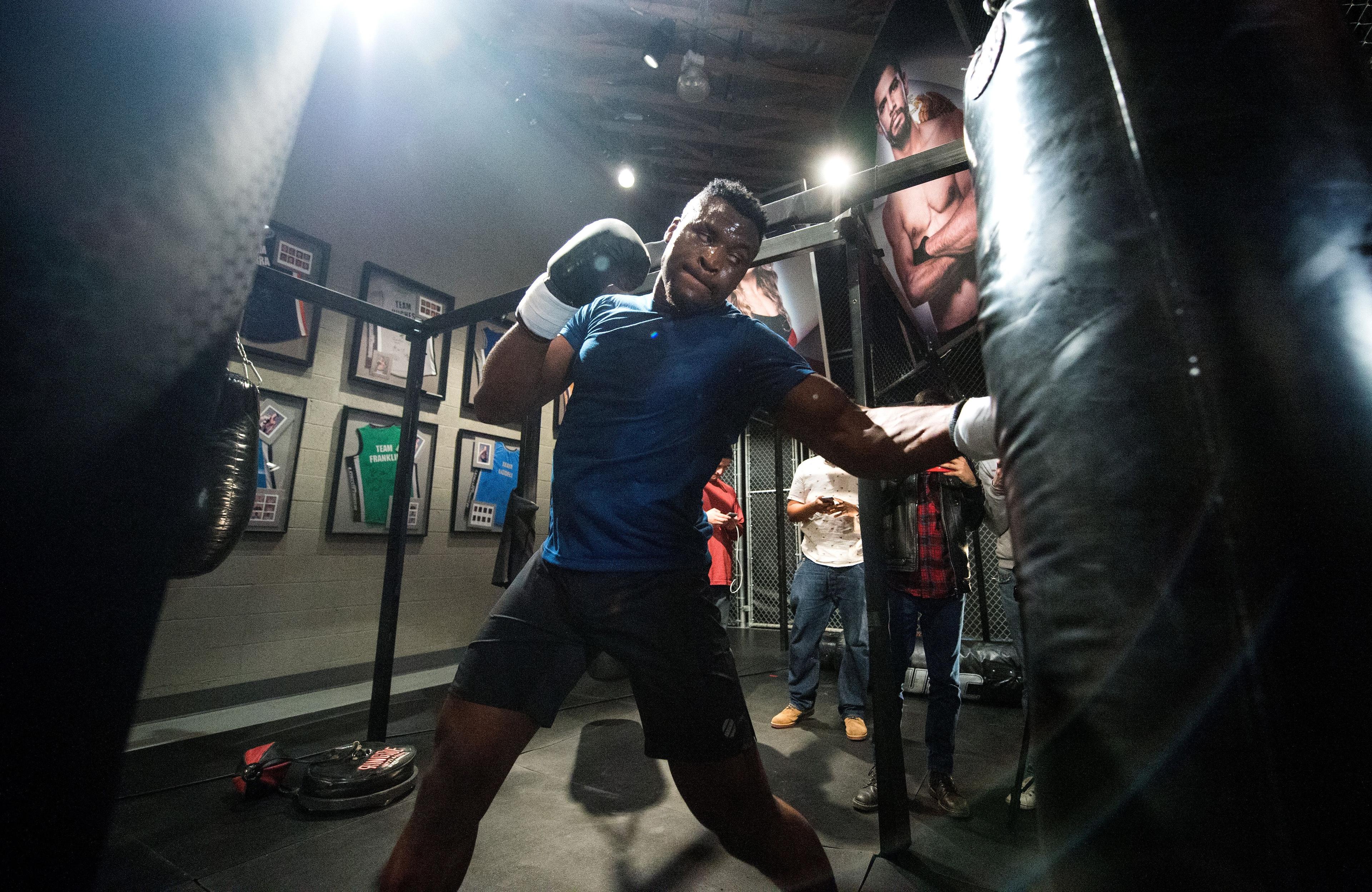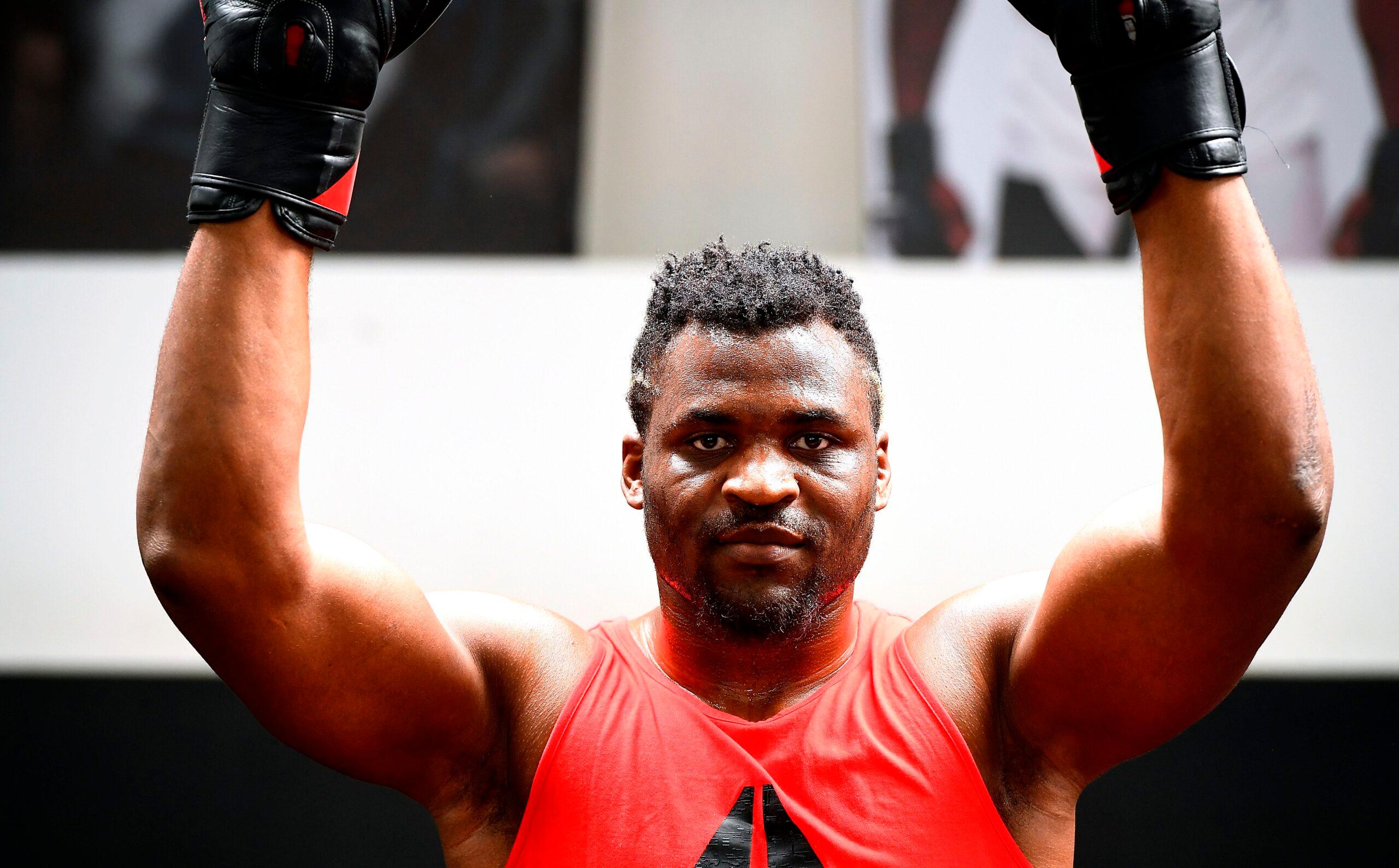Sitting courtside at a recent Celtics game, Francis Ngannou talks about his own inevitability. His hands are the size of boule loaves, and over the past couple of years, those hands have done the kinds of things to the heavyweight division that make this Saturday night’s UFC 220 title fight feel like a foregone conclusion. Like it’s inevitable that Stipe Miocic will fall.
Before Ngannou came along, Miocic — the UFC’s current heavyweight champion — was the beast, the Cleveland marauder who drew X’s over people’s eyes, who took whatever TNT that linebacker-size men could throw at him and shoved it down their throats. Maybe Miocic still is the beast. But listening to Ngannou tell the tale of his rise — and his conquering — is straight-up harrowing. He’s the colossus come to stop Miocic.
“Yes, it is inevitable,” he said at the game, as if bending destiny were no different from bending Anthony Hamilton’s arm. “And Stipe, he knows that, too. He knows that I’m the champ. I’m pretty sure that right now he’s really scared about what’s going to happen.”
How do you promote a fight? By speaking of a killer in dismissive terms. Who is Francis Ngannou? A heavyweight unicorn who is part Mike Tyson, part Ivan Drago, part wild imagination. This is a man who has already thoroughly envisioned his victory, right down to the last reflections.

Trying to predict what’s at stake in a high-profile, non-title fight in the UFC has become more and more an exercise in futility. Tony Ferguson has won 10 fights in a row, including the interim lightweight title in October against Kevin Lee, yet there are no guarantees he’ll face actual champion Conor McGregor anytime soon. Some roads lead to a tunnel painted on the side of a canyon wall, meant to dupe the roadrunner.
That is, unless the UFC likes you. When the UFC likes somebody, things get a little more predictable. Back in 2011, the UFC couldn’t mainline the young phenom Jon Jones, then 23, to a title shot quickly enough. All it took was a win over Ryan Bader and — right on cue — for his training partner Rashad Evans to fall out of a title shot with Mauricio “Shogun” Rua for the matchmakers to race to the phone. When McGregor beat journeyman Dennis Siver — Dennis freaking Siver, the real-life version of Von Kaiser — the UFC wasted no time in booking him against featherweight champion Jose Aldo. Later on, when McGregor announced that he’d rather take a crack at history and fight for a second title at lightweight rather than defend the 145-pound title, the UFC virtually hip-checked contender Frankie Edgar right out of line to make it happen.
The UFC, whose business is all about building contenders, will always find an excuse to expedite the right kind. Lucky for Ngannou, the UFC likes him. It likes him a lot.
The 6-foot-4, 250-pound French Cameroonian became all the rage at heavyweight after his fight last month against the hard-kicking Dutch behemoth Alistair Overeem at UFC 218 in December 2017. Just like with McGregor, there wasn’t any guesswork as to what was on the line. If Ngannou were to beat Overeem, the UFC would roll out a red carpet leading straight to Miocic. And Ngannou didn’t just beat Overeem — he landed an uppercut that collapsed Overeem in on himself, like an old stadium being imploded in a series of smoke and flashes. It was a thing of spectacular, devastating beauty.
It was like watching Tyson tear through Alfonso Ratliff right before his title run. Because just like that, Miocic — who can break the UFC’s all-time mark for heavyweight title defenses with three on January 20 — somehow became seen as the Trevor Berbick figure in this story. A heavyweight champion on the verge of making history was reduced to becoming Ngannou’s Next Victim through a punch he had nothing to do with.
That’s the kind of power Ngannou has. The UFC couldn’t book Ngannou into a title fight fast enough.

Eleven days after Ngannou dispatched Overeem with that uppercut in Detroit, he was in Boston to help promote his title fight with Miocic. That day, Ngannou appeared with current light heavyweight champion Daniel Cormier in studio at a local radio station, WAAF 107.3. The media-savvy Cormier — who will defend his title against Volkan Oezdemir in the co-main event that same night at UFC 220 — did all the talking, while the DJs feigned horror at the sight of Ngannou, the giant who communicated everything he needed to through the hosts’ astonishment. One of them asked Ngannou what he eats, as if he were a not-entirely-human specimen they were trying to understand.
“Steak,” Ngannou deadpanned.
Being that he was in Boston, the hosts began comparing him to the closest freak proxy, Rob Gronkowski, the 6-foot-6, 265-pound tight end for the New England Patriots. They explained to him that if fans at the TD Garden began chanting “Gronk” during his fight, well, that’s why. One of them even asked Ngannou — who is neither Russian nor white — to recite Ivan Drago’s famous line after he left Apollo Creed in poor order in Rocky IV, “If he dies, he dies.” Why? Because Ngannou is the new prototype of terror who walks away from every vicious knockout with almost no emotional attachment to it. He also happens to be foreign, which for Boston radio can be a telltale sign of obvious villainy, and he trains in a lab (the UFC Performance Institute).
The big heavyweight played right along by reciting the line, and everyone — including Cormier — laughed like they had taught a lion to shake hands.
What really stood out, though, was that Cormier kept having to remind everyone that Stipe Miocic is deadly, too. That for as menacing as Ngannou looks, and even with six finishes in six UFC fights, Miocic is a big-game hunter who has doled out five straight knockouts of his own, the latest against Junior Dos Santos, a heavyweight who began his own career in the UFC going 9–0. To sleep on Stipe is to get slept, Cormier was trying to point out. At heavyweight, it’s really who finds whose chin first.
But nobody was taking that talk too seriously, not with the elephant sitting right there in the room. When UFC president (and New England native) Dana White came on the phone during the segment, he fairly glowed over Ngannou. He talked about this fight being one of the biggest heavyweight clashes in UFC history. He feigned his own astonishment.
“Just look at him,” White said. “He’s a monster!”
What he didn’t say outright was pretty obvious for anybody who follows MMA closely, too: With top pay-per-view draw Conor McGregor now operating on his own timetable, and Ronda Rousey reportedly headed for the WWE, and the #GOAT Jon Jones awaiting disciplinary action for his latest failed drug test, that quiet hulk sitting right there, mashing his fists in the countdown to January 20? He’s the next big thing. He’s the one who can make the heavyweight division more glamorous than it was during Brock Lesnar’s and Cain Velasquez’s title reigns, while at the same time dusting off the most user-friendly clichés in the fight game.
Particularly the one that goes, “Don’t blink.”

Though Ngannou is the buzz name in the industry, he’s not yet widely recognized outside of it. That same night he was at the Celtics game— though he was right there in plain sight, and obviously somebody — people couldn’t seem to place him. He wasn’t flashed on the Jumbotron to show a celebrity in attendance. People weren’t coming up to him for selfies. Some of the players seemed to have an idea of who he was, but not all.
Right now, Ngannou is on that weirdly exhilarating cusp between arriving and having arrived, and his whole business of being in Boston is to try to fast-track that crossover. Before his fight with Overeem last month, the features started rolling out in anticipation of it. Bleacher Report and MMA Fighting ran long profiles focused on all that he had to overcome en route to the fight, a story that makes Tyson’s wild youth in Brooklyn seem somewhat ordinary.
In a nutshell: He grew up one of five children in extremely impoverished circumstances in Batié, Cameroon, with a single mother from age 6; his father, a notorious street fighter, gave his family a bad name; to help his mother out, he went to work in the sand mines from age 12; at 22, he left for a chance at a better life in Cameroon’s largest city, Douala, to pursue boxing; he took the leap from Douala to Paris a few years later; he lived there, homeless, until he met his coach Fernand Lopez, who opened his gym to him and gave him a home; he switched to MMA, reluctantly, while training there, and had his first pro fight in November 2013 against Rachid Benzina, just a couple of months after he began training.
In four years he’s gone 11–1 — his lone loss occurring just two weeks after his debut against Zoumana Cisse, when he was still early in his cramming session to learn MMA — with all 11 of his victories coming via finishes (seven by KO/TKO, four by submission). He moved to Las Vegas seven months ago from France, and has emerged — at 31 years old — as the scariest man on the planet. It was a personal voyage through hell to arrive at being an overnight sensation. And each step he has taken in the UFC has made the floorboards rattle, as if a giant were drawing near.
Right around the time he grabbed strongman Anthony Hamilton’s arm in a clinch and panic-tapped him with a Kimura moments later, people began paying serious attention to him as an intrigue at heavyweight. When he knocked out former champion Andrei Arlovski with an off-balance uppercut, it was almost like you could hear the rumbling through the trees. By the time he blasted Overeem, you could hear the ticking on the clock for the showdown with Miocic.
His hands are marvels unto themselves. When the Nuggets guard Gary Harris, who has strikingly big hands in proportion to his slinky 6-foot-4 frame, inbounded a pass near Ngannou, there was no comparison. Ngannou’s triple-XL’s are old-timer catcher’s mitts, the kind that make other hands disappear during introductory handshakes. They are calloused and hard from all those years moving sand in the quarries back in Cameroon.
Those hands are the business end of his power, a power that is already making him into a kind of fight game unicorn. Dana White likes to point out — with as many exclamation marks as he can — that Ngannou broke the world record for punching power at the UFC Performance Institute in Las Vegas (where he’s spending most of his waking hours these days), where he punched a bag that gauged his force. Kickboxer Tyrone Spong at one point registered 114,000 units of power, which sounds like enough to crack a mountain face. Ngannou did over 129,000 units with his overhand right. Whatever he hits, he destroys. This is where the Drago comparisons come from. The breaking of machines with his fists, and the curiosity of what that might mean to human jaws.
It’s kind of unfair to compare me to Tyson, too, because my way of liking Tyson is not because he knocked people out. It was how technical he was. A heavyweight who can move like that, and be as technical like that, it’s not something you saw often.Francis Ngannou
“To just focus on power is a mistake, because you don’t need power,” he told me. “It’s about what to do. Even with less power someone can do something very drastic. And then power, it might go away. So it’s something you can manage to figure in technique. You just keep improving, and someday when your power starts going away, your technique will grow up and you’ll manage with it.”
Technique is what Ngannou wants to be known for. Even the parallels between him and late-’80s Tyson — a fighter whom Ngannou came to idolize as he fell in love with boxing — strike him as a little misguided.
“It’s kind of unfair to compare me to Tyson, too, because my way of liking Tyson is not because he knocked people out,” he said. “It was how technical he was. A heavyweight who can move like that, and be as technical like that, it’s not something you saw often. In one or two generations you have that type of guy maybe once. You can put on a Mike Tyson fight and then show how to box. You’re going to avoid [a punch] like this, you’re going to do your footwork like this, you’re going to put your guard like this. He did it perfectly. And that is why I love Mike Tyson.”
Though he is built like Hollywood’s exaggerated version of a heavyweight fighter — broad chest, 83-inch reach, muscles covering every square inch, a neck with cables bulging through, now with a lightning rod in his hair — Ngannou is agile and surprisingly light on his feet. His boxing background allows him to project an airy feeling, even when he’s stalking forward to take somebody’s head off. When he gets into an exchange, he is quicker to the trigger that anyone else. It’s deke, slip a punch, and counter — boom, all over. That’s the way he prefers it — quick, violent, and jaw-dropping.
His longest fight in the UFC so far came in Croatia against Curtis Blaydes, a wrestling-minded opponent who wanted to make things toilsome and ugly. Blaydes survived two rounds, but was not allowed to answer the horn for the third. His eye was swollen shut, and he couldn’t see out of it. That face became a kind of cautionary tale for anyone thinking about sneaking into a singlet against Ngannou. When he made his UFC debut, Luis Henrique tried a similar approach with him, and paid dearly in the second round. By trying to offset and neutralize his power via suffocation, all he did was piss Ngannou off.
Poor Bojan Mihajlovic, whom Ngannou faced in Chicago in 2016, didn’t know what hit him. “It had never happened to me up until then that someone shuts me down for a moment with a punch,” the Serbian told me of Ngannou’s power. “And I had a feeling he barely touched me.”
“I always like to win my fight early and then go back home,” Ngannou says when I mention his urgency. “The fight of the night doesn’t concern me. I’m concerned with performance of the night. I’m not one to take punches and get tired for 15 minutes to get performance of the night. I want to do it in five minutes, two minutes, and get fighter of the night.”
Ngannou can’t be described as charismatic, and he doesn’t talk a lot of smack. His English has come along over the past couple of years, coinciding with his rise up the ranks. Stipe Miocic — a fireman by day whose idea of selling a fight is to say, “He’s not taking my belt!” — isn’t likely to engage in a war of words with him, anyway. (The UFC 220 media call late last week was a comically drowsy affair.)
I think that people might be surprised and maybe a little disappointed, because it will be very fast.Francis Ngannou
In his case it doesn’t matter. Ngannou’s contract with his audience falls more in line with Rousey’s original contract with hers — to destroy an opponent as quickly and ruthlessly as possible. To charge a few seconds with tension wires, and make people lean forward in anticipation for as long as it lasts. Through a six-fight sample size of UFC appearances, Ngannou appears to have it all — Lesnar’s physical appeal, Rousey’s viciousness, Jones’s reach, and, well, Tyson’s power. The stars are aligning brilliantly for him to be the next transcendent name in MMA, right at a time — with its television deal with Fox expiring at the end of 2018 — when the UFC needs stars most.
“I’m ready to be a star, but not the type of a Conor McGregor,” he says. “I mean, I feel like we are not the same thing. We don’t have the same interests. We don’t have the same lifestyles. As for TV and making appearances, like this,” he lifts his hands to indicate the TD Garden, where he will fight this Saturday in front of 20,000 people, “it’s part of our job. It’s how we promote our fight. It’s how we promote ourselves. It’s how we earn our money.”
No, he’s nothing like McGregor. When I ask him if he feels that this is the biggest heavyweight fight in UFC history, he shakes his head.
“I think that people might be surprised and maybe a little disappointed, because it will be very fast,” he says.

In the UFC they wear 4-ounce gloves to protect the knuckle, not the target. When wins and losses can be broken down to milliseconds within an exchange, the UFC is more commonly the place where hype goes to die. Velasquez was supposed to be the best heavyweight of all time, up until the moment Junior Dos Santos knocked him out in a minute back in 2011. At UFC 217, undefeated bantamweight champion Cody Garbrandt — who was pegged to be the next transformative star based on his youth and prowess — got knocked out by T.J. Dillashaw. That same night, Joanna Jedrzejczyk, thought to be in a league of her own at strawweight, got knocked out by Rose Namajunas. Even Cynthia Calvillo, whom Dana White said had that “it factor” that Rousey and McGregor had, got dragged back down to earth by Carla Esparza at UFC 219.
No sport fails its own narratives as frequently as MMA. If the UFC has booked Ngannou to take out Miocic, it will very soon try to find the man to beat Ngannou. That’s the part of the game that excites Ngannou most. That the heavyweight division will one day have to come to him for a game of wheelhouse roulette, in attempts to take his belt. He suspects that fans prefer it that way, too, as there’s never been a heavyweight champion with all of his tools. On the media call last week he said he knew he was the kind of champion the division has been waiting for.
“I’m the guy that’s going to change the heavyweight division,” he said. “It starts on January 20, and [I’m going to] bring more excitement for [the] heavyweight division, which was for a long time almost forgot about.”
I always like to win my fight early and then go back home. The fight of the night doesn’t concern me.Francis Ngannou
He told me in Boston on that initial visit that he understood selling imposition, and delivering on fears. And he knows he has the power in his fists that can turn into a better life for him and his mother back in Cameroon, into stardom, and into main events that generate pay-per-view shares and everything else. In contrast to all the plodding heavyweights, who clamp down on their mouthpiece and throw bombs, he sees things a little differently. He gets a sparkle in his eye when thinking about himself as a 6-foot-4 mirage in the cage, who can materialize at any moment and knock out the most powerful men on the planet.
“It’s not easy to shoot a target that moves,” he said, like he was letting me in on a secret. “My game plan is always like Muhammad Ali — float like a butterfly, sting like a bee.” Then he rubbed his giant hands together, as if trying to keep them busy while he waits.
“You know, this is a big-risk game,” he said. “All of us in this division have the power. Everyone is capable to knock you down if they connect with you. So if you want to make your game to be different and show something different, do some pad work. Work on your speed, work on your footwork, your movement, your technique. Try to do things perfectly.
“That’s how you distinguish yourself from all the other fighters in the UFC.”
It doesn’t hurt when the UFC president markets you as a monster, either, especially when “monster” in this case is shorthand for the unicorn that the heavyweight division has been waiting for.